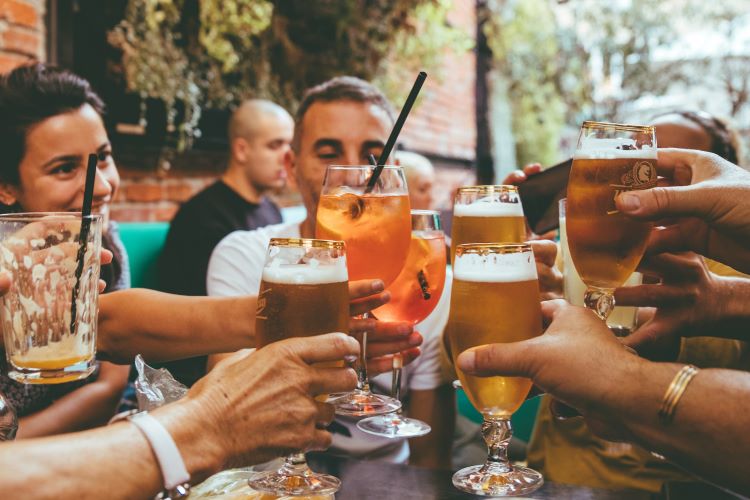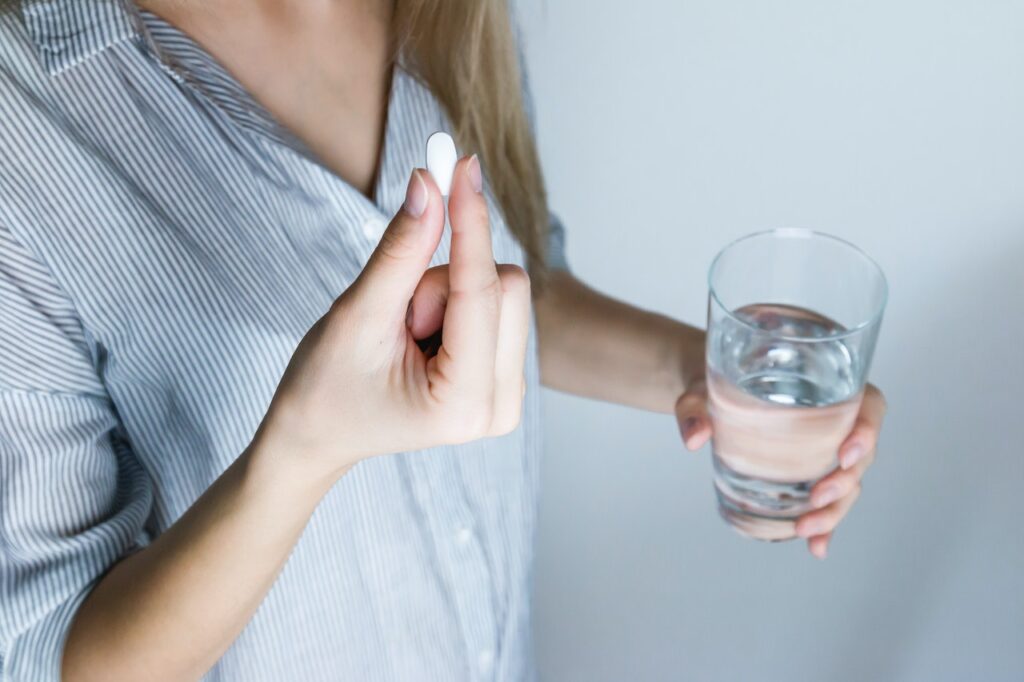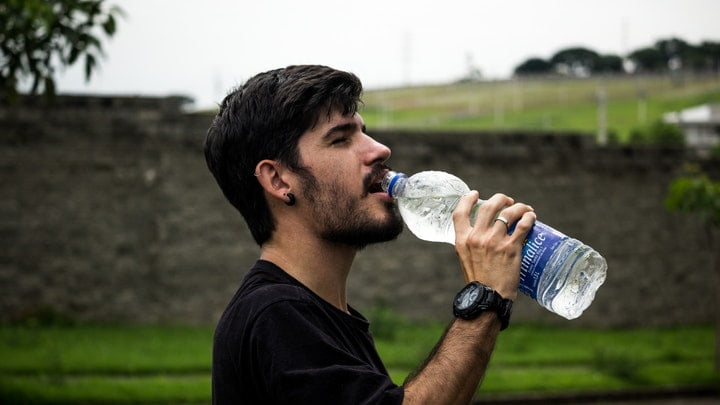Pancreatitis is a serious disease which can if left untreated, lead to severe complications.
In the UK, “30,000 people are affected by acute pancreatitis each year.”[1] 25% of acute pancreatitis are caused by alcohol use.[2]
It’s important to be aware of how alcohol affects the pancreas, how this has a knock-on effect on your overall health, and finally what to do should you have symptoms or a diagnosis.
The Pancreas and its Function

The pancreas is one of your internal organs that makes up part of the digestive tract. It’s right behind the stomach and is roughly the size of your hand. It has some important jobs to do about digesting food and helping your whole body to function smoothly.
One task of the pancreas is to release digestive enzymes (from acinar cells) and exocrine hormones. These break down and digest fats, proteins, and carbohydrates, and regulate blood sugar levels.
You might have heard of insulin, along with glucagon, hormones that regulate blood sugar. Insulin is released by the pancreas to lower blood sugar and glucagon is released to elevate it when levels are too high.
This is important because sugar levels are key in supporting vital organs such as the brain and liver to function normally. Of course, when this system becomes dysregulated diabetes becomes a health risk.
What is Acute Pancreatitis?
The development of pancreatitis can be quite rapid in which case it’s likely the person has acute pancreatitis. It causes severe pain, especially around the ribs and back. Predominantly there is abdominal pain. Symptoms also include a high temperature, shivering, nausea, and sickness. While the cause is sometimes unknown, it can also be caused by gallstones.
What is Chronic Pancreatitis?
Chronic pancreatitis means long-lasting and is caused by inflammation of the organ. The pancreas stops working effectively because of this. This chronic disease can cause pain in the abdomen and back, weight loss, nutritional deficiencies, and greasy potent-smelling stools. In such cases, the risk of pancreatic cancer is higher.
Alcohol Effects on the Pancreas

Heavy drinking and regular binge drinking are both trigger factors for alcohol-induced pancreatitis. The pancreas and its acinar cells are seriously damaged by the toxic effects of alcohol. This causes chronic pain and can at worst be fatal.
When there’s heavy alcohol consumption, there’s an activation of pancreatic enzymes in the pancreas rather than in the small intestines (where they’re supposed to activate). What this means is that the enzymes cause the pancreas to start digesting itself and this leads to inflammation.
This can lead to alcoholic pancreatitis.
What are the Main Causes of Pancreatitis?

There are several main causes of pancreatitis and these include:
- Genetic diseases that impact the pancreas and its functioning
- Heavy alcohol use
- Gallstones
- Viruses or parasites that cause injury to the pancreas
Is Alcohol-Induced Pancreatitis Treatable?

There are things you can do to help alcohol-induced pancreatitis. While acute pancreatitis can be eased and reduced, the truth is that the damage caused by chronic pancreatitis can be irreversible.
The most important thing to do if you develop alcoholic pancreatitis is to stop drinking. Your doctor will provide a diet plan and assess your health needs to create a set of guidelines to follow to manage and reduce symptoms.
Chronic pancreatitis needs more long-term solutions, and sometimes surgery is required. In worst cases, it’s not possible to heal. The goal is to manage symptoms with medication and support to the gastrointestinal tract.
The most important action you can take is to stop drinking alcohol.
What are the Long-Term Effects of Alcohol-Induced Pancreatitis?

There are many negative health effects of alcohol-induced pancreatitis. All of these have severe impacts on you and your life. From affecting how you enjoy food, to your cognitive processing abilities, to causing severe pain.
- Malnutrition – this can go on to impact all areas of body functioning including the gastrointestinal tract, the immune system, and the cardio-respiratory system.
- Impaired sugar regulation and metabolism can lead to diabetes.
- Damage to the bile duct – this can lead to infections, bleeding, and dehydration, which are associated with osteopenia and osteoporosis.
- Organ failure impacting the heart, lungs, and kidneys can occur.
- Having pancreatitis makes it more likely that you might develop pancreatic cancer.
Alcohol Use Treatment

As mentioned already, one of the best ways of managing symptoms of and reducing the likelihood of developing pancreatitis is to stop drinking alcohol.
The trouble is, for the people who drink at the levels where pancreatitis is likely to develop, it is much harder to stop.
In fact, for some – those who have a severe addiction, or a dependence -, it can be dangerous to do so without professional and medical treatment. The safest way to quit alcohol is by having a medically-supervised detox and by participating in psychotherapy, holistic therapies, and group sessions. All of these are offered at private rehab clinics.
More About Alcohol Detox
Alcohol detox usually lasts between seven and fourteen days. It depends on how long you’ve been drinking and how heavily as well as what your circumstances are (i.e. height, weight etc.). The more severe your withdrawal usually is, the more likely you are to need a monitored detox.
Alcohol withdrawal symptoms include:
- Delirium tremens including shaking, sweating, and hallucinations
- Confusion and anxiety
- Insomnia and mood swings
- Sickness and diarrhoea
- Seizures
At rehab, a doctor will assess you and start you off on a prescription for Librium. This medication reduces all the withdrawal symptoms so that you ease off alcohol in a safe way. This is important as seizures, at their worst, can be fatal. The dosage of medication is gradually reduced over the detox period to the point you’re substance-free.
Rehab therapies to treat alcohol use
Although the detox stage might last between one and two weeks to ensure you remain sober, a longer private rehab clinic stay is highly recommended.
This is to treat the psychological addiction that exists as well. Doing so is imperative to ensure that you remain sober long-term.
The psychological therapies and holistic treatments on offer provide you with the tools required to manage cravings, process emotions effectively, and develop a meaningful abstinent lifestyle.
The therapies and activities you’ll take part in include:
- Cognitive behavioural therapy – to address how mind and thoughts affect behaviours
- Dialectical behavioural therapy – to provide you with the skills to manage emotions effectively
- Motivational interviewing – to support you to find the deep drive to recover
- Holistic therapies connect the mind and body and offer you ways to relax through yoga, tai chi, art and music therapy, reiki, ear acupuncture, and mindfulness
- Regular group sessions that follow SMART recovery and 12 Step guidelines to heal through a socially connected approach
Is There An Alcohol Rehab Clinic Near Me?

To get the best type of alcohol use disorder treatment, entering a private rehab and staying as a resident offers you the best way of becoming sober. Doing this will help prevent pancreatitis and to manage symptoms if you have it.
You can call the OK Rehab team for information about rehab care, alcohol detox and treatment, as well as how your physical health is supported at an addiction clinic.
There are clinics throughout the UK. Wherever you are, there will be a variety of options. You’ll want to find one which suits both your treatment and health needs, as well as your budget requirements.
Tips To Stop Pancreatitis From Developing…

There are a few things that greatly reduce the likelihood of pancreatitis developing. If you participate in the following suggestions you’ll improve future health outcomes and likelihood of developing the disease…
- Moderate your drinking, or even more effectively, stop drinking alcohol altogether.
- Stay hydrated by drinking lots of water each day (1.5 litres is a good amount).
- Eat and maintain a healthy diet that includes fibre (this helps with digestion) and foods that have all the essential vitamins and nutrients to support your body to function.
Final Thoughts…

Both acute and chronic pancreatitis are severe conditions which cause serious pain. Acute is much more treatable and easier to heal from. Chronic can reach a point that is untreatable and where you need to be guided by a health plan and medication to manage symptoms.
If you’re worried you might be at risk then it’s vital to speak with a doctor for advice. Aside from this, you’ll want to quit drinking alcohol. This is imperative. The best place to go for a comprehensive treatment plan to help you become sober is a private rehab clinic.
To find out where the clinic most suited to your needs is, contact OK Rehab today.
FAQs
1. Can drinking too much alcohol cause pancreatitis?
Yes, drinking too much alcohol can cause pancreatitis. Alcohol and gallstones are the two most common causes of pancreatitis.
2. How much does alcohol affect pancreatitis?
Alcohol has a serious effect on pancreatitis. Not only does it cause it, alcohol can exacerbate it and this in turn leads to many negative health implications including increasing the risk of diabetes and cancer.
3. Can I ever drink alcohol again after pancreatitis?
It’s highly recommended that you quit drinking alcohol after developing pancreatitis. This is especially important if you have an addiction. For more advice, speak with a doctor or alcohol worker.
4. Can alcoholic pancreatitis be cured?
Acute pancreatitis can improve given the right conditions, treatment, and if you quit drinking alcohol. Chronic pancreatitis isn’t curable, but symptoms can be managed if you follow the advice and care of medical professionals.
References
[1] https://gutscharity.org.uk/research/psps/shape-the-future-of-pancreatitis-research/





